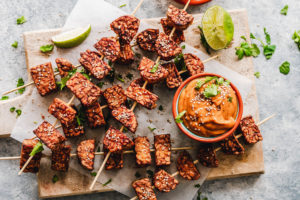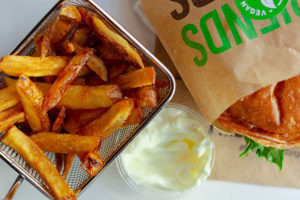Think that you can’t afford to eat a whole foods plant-based diet? You can’t really afford not to.
Is it expensive to eat healthfully?
Well . . . that depends. Because of course, if you’re talking about an exclusively organic, entirely whole foods diet, and you’re comparing it to the most nutrient-negligent, gas-station bought, bottom of the barrel processed food-like-substances available, well then of course the real food is going to cost “more”(in the short term, that is – we’ll touch on that later).
Slim Jims and Ramen will always be cheaper than real food, so we’re going to have to set that stuff aside for the sake of discussion.
We’re trying to compare apples to apples here . . . or, conventional apples to organic apples, as it were. And when you do that – when you make fair comparisons – you see that YES, eating healthy is more expensive. Wait what?
Well it is! I’m not going to lie to you. But look, it’s only just barely more expensive.
Seriously, I’m talking a few nickels here, a few quarters there. If you do it right, it adds up to a few extra dollars per trip, depending on how often you shop. What’s that old saying? “You can pay for your health now, or you can pay for it later – with interest”.
Because let me tell you, prescription medications, surgery, and disease-induced disability? Now that’s what I call expensive! And those are the kinds of diet-related results that make wholesome foods suddenly seem pretty dang cheap.
So even at a little extra cost (and I do mean little) in the short term, I think it’s very well worth it. Here’s a few ways to keep those costs as low as you can, while assuring that your health is soaring sky-high.
- First and foremost, buy in bulk. This advice gets tossed out all the time, but have you ever really followed up on it? Think about this: a can of organic pinto beans at Safeway will set you back $2.49 (not too shabby!).
But at my health food store, I can get a pound of organic pinto beans (dried) for only $1.89. That’s over 4 cans worth of beans once they’re cooked.
That is a lot of protein for under $2! You can buy in bulk for beans and legumes, grains and breakfast cereals, nuts and seeds, dried fruits, syrups and oils, flour and baking ingredients, and all sorts of other foods, and it will save you mountains of money. Capiche? Okay, moving on. - Stop buying beverages. Period. Water is practically free and it’s much better for you. (we don’t need to tell you to skip the plastic bottles do we?)
- Stop buying packaged foods. They are marked up by a mile, and there’s nothing “convenient” about an empty wallet.
- Grow your own. This is especially cost-effective with fresh herbs, which, for all you apartment dwellers, are easy to grow on the kitchen counter.
- Buy organic produce that makes the dirty dozen. If you have to, it’s okay to buy conventional for the rest (see also: the clean fifteen).
- Frozen veggies are cheap but the quality is similar to fresh. Canned veggies lose nutrients, so choose frozen and you won’t have to worry about them going bad.
- Eat plant protein. By weight and by calorie, legumes are cheaper than meat, end of story. People who do physical work in cold climates may need more fat and protein, but even someone like a roofing contractor can cut the cost of his daily diet by substituting legumes for some of the animal protein that he consumes. You’ll see that beans (especially when combined with a healthy fat like olive oil or avocado and a little bit of salt) really do provide plenty of energy.
- Shop the farmer’s market, because buying direct cuts out the middle man. Bonus tip: show up when the market is closing. The selection won’t be as good, but you’ll be able to strike a great bargain with farmers looking to unload the last of their stock. Though farmer’s markets proliferate during the summer months, some communities offer winter farmer’s markets.
- And most importantly, pay attention! Sometimes the brand name IS cheaper, when it’s on sale. Sometimes the box DOES cost less than the bulk, for no apparent reason. So keep your eyes open, try to enjoy the bargain “hunt”, and make a game of it.
It helps to keep a list of the cheapest sources of organic and whole foods so that you can organize your shopping trips accordingly. Sometimes deals pop up in unexpected places.
Like at Whole Foods market, which has earned itself the nickname “Whole Paycheck”. But there are some things that Whole Foods offers for super cheap. For example, their house brand (“365”) organic items are some of the cheapest around, by a significant margin.
The Whole Foods price beats out the standard grocer, and every small co-op I’ve ever been to. Sometimes it’s even cheaper than making it yourself, though of course homemade will be healthier.
– SR
Reprinted with permission from Sayward Rebhal
Author of Vegan Pregnancy Survival Guide founder, BonzaiAphrodite
“Socially Conscious, Totally Fabulous!”



